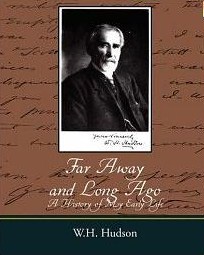W.H. Hudson
Far Away and Long Ago

Written in 1918 by this Englishman who tells about his life as a boy in the Argentine Pampas. Filled with intense melancholy -but at the same time joy- that those recollections produce in his memory. Whoever reads this biographical account cannot but adore this man.
He achieves the difficult task of making us readers see nature, wildlife, and human beings with the same eyes as his young and avid ones. He talks a lot about plants and birds, and this to me is the only minus I can find, since I sympathize with his love for nature but cannot go along with his terminology. He describes the people he met and that left in him a greater impact. His family, the daily chores at home and in the fields; but above all we get to feel like a child, to see that far away wilderness with the innocence and vulnerability of a little kid.
However, the book wouldn't have been more than a picturesque story of an English child in the Pampas if it wasn't for the last 3 or 4 chapters. The death of his mother, his illness and the sentence inflicted by the doctors of a short life, the angst of knowing that his beloved nature, trees, birds and all to be lost soon, produces a struggle of faith against the pullings of new-come Darwinism and its partisans. A struggle that millions must have gone through -as the author admits- but I can't think that anybody could describe it so beautifully.
How different those two men must have been: Darwin and Hudson. “Darwin, writing in praise of the gaucho in his Voyage of a Naturalist, says that if a gaucho cuts your throat he does it like a gentleman: even as a small boy I knew better- that he did his business rather like a hellish creature reveling in his cruelty.”
Hudson´s parents were Protestant Christians, true believers. Not all his brothers inherited the parents' faith: the desire for immortality is not universal, as he mentions. But W.H.Hudson´s desire was enough to grant him the faith he so much struggled to retain in the passage from childhood to manhood.
An inspiring story, humbling and beautifully told.
